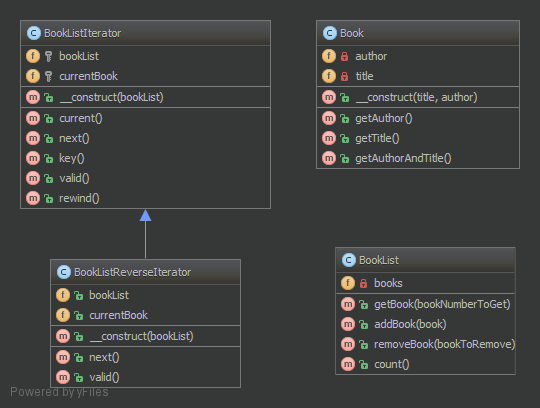Iterator Pattern
Purpose
The purpose of the design pattern
To make an object iterable and to make it appear like a collection of objects.
Note - Standard PHP Library (SPL) defines an interface Iterator which is best suited for this! Often you would want to implement the Countable interface too, to allow count($object) on your iterable object
UML
UML design pattern diagram

Code
Code snippets
Book
Book is a simple class with a construct which accepts some strings and getter methods which return them.
namespace DesignPatterns\Behavioral\Iterator;
class Book
{
public function __construct(private string $title, private string $author)
{
}
public function getAuthor(): string
{
return $this->author;
}
public function getTitle(): string
{
return $this->title;
}
public function getAuthorAndTitle(): string
{
return $this->getTitle() . ' by ' . $this->getAuthor();
}
}
BookList
BookList contains an array of Book objects. Books can be added (addBook) and removed (removeBook). BookList implements Countable and Iterator interfaces ensuring it contains various methods such as count, current, key etc.
namespace DesignPatterns\Behavioral\Iterator;
use Countable;
use Iterator;
class BookList implements Countable, Iterator
{
/**
* @var Book[]
*/
private array $books = [];
private int $currentIndex = 0;
public function addBook(Book $book)
{
$this->books[] = $book;
}
public function removeBook(Book $bookToRemove)
{
foreach ($this->books as $key => $book) {
if ($book->getAuthorAndTitle() === $bookToRemove->getAuthorAndTitle()) {
unset($this->books[$key]);
}
}
$this->books = array_values($this->books);
}
public function count(): int
{
return count($this->books);
}
public function current(): Book
{
return $this->books[$this->currentIndex];
}
public function key(): int
{
return $this->currentIndex;
}
public function next()
{
$this->currentIndex++;
}
public function rewind()
{
$this->currentIndex = 0;
}
public function valid(): bool
{
return isset($this->books[$this->currentIndex]);
}
}
IteratorTest
Unit test showing the design pattern in action.
namespace DesignPatterns\Behavioral\Iterator\Tests;
use DesignPatterns\Behavioral\Iterator\Book;
use DesignPatterns\Behavioral\Iterator\BookList;
use PHPUnit\Framework\TestCase;
class IteratorTest extends TestCase
{
public function testCanIterateOverBookList()
{
$bookList = new BookList();
$bookList->addBook(new Book('Learning PHP Design Patterns', 'William Sanders'));
$bookList->addBook(new Book('Professional Php Design Patterns', 'Aaron Saray'));
$bookList->addBook(new Book('Clean Code', 'Robert C. Martin'));
$books = [];
foreach ($bookList as $book) {
$books[] = $book->getAuthorAndTitle();
}
$this->assertSame(
[
'Learning PHP Design Patterns by William Sanders',
'Professional Php Design Patterns by Aaron Saray',
'Clean Code by Robert C. Martin',
],
$books
);
}
public function testCanIterateOverBookListAfterRemovingBook()
{
$book = new Book('Clean Code', 'Robert C. Martin');
$book2 = new Book('Professional Php Design Patterns', 'Aaron Saray');
$bookList = new BookList();
$bookList->addBook($book);
$bookList->addBook($book2);
$bookList->removeBook($book);
$books = [];
foreach ($bookList as $book) {
$books[] = $book->getAuthorAndTitle();
}
$this->assertSame(
['Professional Php Design Patterns by Aaron Saray'],
$books
);
}
public function testCanAddBookToList()
{
$book = new Book('Clean Code', 'Robert C. Martin');
$bookList = new BookList();
$bookList->addBook($book);
$this->assertCount(1, $bookList);
}
public function testCanRemoveBookFromList()
{
$book = new Book('Clean Code', 'Robert C. Martin');
$bookList = new BookList();
$bookList->addBook($book);
$bookList->removeBook($book);
$this->assertCount(0, $bookList);
}
}
Ready to bring your vision to life?
We believe in excellence, empathy, integrity, and transparency throughout the process. Our goal is to build fast, responsive websites that not only perform but also reflect your values and vision.